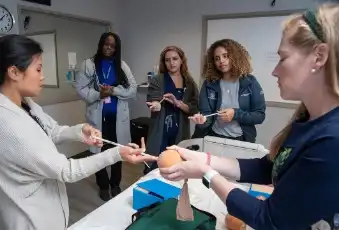BSN to DNP learners take part in OCIs that involve working with patients and genitourinary teaching associates while engaging in high-fidelity simulation. Learners refine their clinical and leadership techniques during OCIs.
Georgetown University’s Doctor of Nursing Practice (DNP) online
Earn a Post-Master’s DNP or a BSN to DNP online at Georgetown University School of Nursing, and learn to integrate organizational leadership and ethics with advanced nursing science.
About the program
- Objective Clinical Intensives: BSN to DNP learners take part in two to three Objective Clinical Intensives (OCIs) where they work with patients and genitourinary teaching associates, engaging in simulations where they refine their leadership and clinical techniques.
- Doctoral Project: All DNP learners are required to complete one doctoral scholarly project that utilizes original research, translating evidence while accelerating the adoption of leadership and clinical best practices.
About Georgetown University School of Nursing
The School of Nursing was founded in 1903. To this day, it intentionally focuses on Georgetown’s Jesuit tradition and academic excellence, and cura personalis — or the caring for the whole person. Nursing learners train to always focus on every individual’s unique needs and life circumstances, and to celebrate the talents their patients bring to their community. The school supports an academic environment that is equitable, diverse, inclusive, and respectful, and places great value on social justice, equity of health, and human rights.
Technology and services powered by 2U, Inc., the parent company of edX.
Program tracks
Georgetown University School of Nursing DNP programs offer two entry points for learners. The BSN to DNP program is designed for registered nurses (RNs) with a Bachelor of Science in Nursing degree; the Post-Master’s DNP is for Advanced Practice Registered Nurses (APRN) or nurses who already hold a master’s degree and who are employed in advanced nursing roles.
- As a BSN to DNP learner, you will:
- Take part in more than 1,000 hours of clinical experience.
- Earn 69–74 credits.
- Participate in two to three Objective Clinical Intensives (OCIs).
- Learn either part time (eleven 15-week terms) or full time (eight 15-week terms).
- Choose one of the following four specializations to guide your degree:
- Adult-Gerontology Acute Care Nurse Practitioner (AG-ACNP)
- Women’s Health Nurse Practitioner (WHNP)
- Dual Nurse-Midwifery/Women’s Health Nurse Practitioner (NM/WHNP)
- Family Nurse Practitioner (FNP)
- Apply newly learned skills in real-world settings as you treat patients during supervised clinical placements.
- As a Post-Master’s DNP learner, you will:
- Take part in more than 250 practice hours.
- Earn 30 credits.
- Participate in one or two on-campus executive sessions.
- Learn part time (five 15-week terms) with DNP on-campus executive sessions and practice hours.
Admissions
Applicants for the BSN to DNP program must hold a Bachelor of Science in Nursing degree, or have earned a CNL/entry-level MS in Nursing from a program accredited by the CCNE or ACEN. They must also hold a U.S. RN license with at least a year of full-time RN experience.
Applicants for the Post-Master’s DNP program must hold a current U.S. RN license. They must also have earned either a BSN degree, or have earned a bachelor’s degree in any discipline along with an entry-level MS in Nursing degree from a program accredited by the CCNE or ACEN. They also need to hold a master’s degree, doctoral degree, or post-graduate certificate with an APRN specialty, or be employed in an advanced nursing role.
To complete an application, you will need to submit:
Professional résumé
Unofficial transcripts
Personal Statement
Letters of recommendation
Intensives and certifications

Frequently asked questions
If you don’t already hold a graduate degree in nursing, the BSN to DNP program enables you to combine master’s- and doctoral-level coursework; prepares you for certification examination to become an APRN; and equips you with the clinical knowledge you need to provide primary, acute, and specialty care in your specialization.
No. A DNP is a Doctor of Nursing Practice degree — an academic degree — whereas an NP (a nurse practitioner) is a professional job title given to nurses who hold an MSN or a DNP.
Many DNP students are already licensed RNs and board-certified NPs. These students often enter DNP programs to prepare for advanced leadership roles in their organization.
The DNP (Doctor of Nursing Practice) is a terminal academic degree which, on its own, does not grant authority to write prescriptions. To prescribe medication as a working nurse, you need to be a board-certified NP (nurse practitioner). Board-certified NPs can prescribe medication in certain states; however, an NP’s scope of practice is determined by state regulatory bodies, not degree-granting institutions.
A DNP-educated nurse may use the academic title “doctor.” Many such nurses choose to clarify their position in a clinical setting where the professional title “doctor” commonly denotes a physician, by listing “DNP” after their name instead. Some states also have strict legislation surrounding where and when a nurse may be referred to as “doctor.”
It depends on your experience level and your preferred learning modality, specialization area, and pace of study. Many DNP programs offer different paths of study — ranging from one to four years in duration — based on a learner’s current credentials, such as an RN license, a BSN, or a master’s in nursing.
No. Nurse practitioners (NPs) and medical doctors (MDs) are highly trained professionals with similar responsibilities. However, MDs undergo an average of 11 years of postsecondary education that includes a residency; NPs undergo six to eight years of postsecondary education with a focus on nursing responsibilities.
